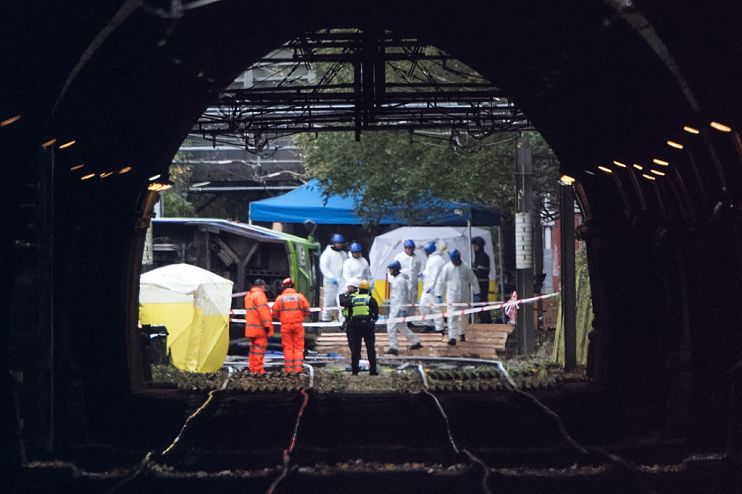Exclusive: Tram risk audit at time of Croydon crash was never revealed to TfL safety panel

The Croydon tram network was undergoing a safety audit at the time of the fatal Sandilands crash in 2016 – a fact not revealed to the chair of TfL’s safety panel at the time.
The former board member, tasked with overseeing investigations into the disaster, described the failure to inform him as “beyond shocking.”
Over the weekend it emerged that TfL had opened an investigation into operational risk at Trams Operations Limited (TOL) – a subsidiary of First Group – three weeks before the accident.
The incident killed seven passengers, the most deadly rail crash of the decade.
Read more: TfL bailout talks continue with Mayor pushing back at Whitehall demands
A draft copy of the audit, obtained by City A.M., shows that fieldwork for the probe was completed on 15 November, six days after the crash occurred.
The initial findings were due to be released on 22 November, but never emerged.
At the time of the crash, Michael Liebreich was the chair of TfL’s Safety, Sustainability and HR Panel, and led the board’s oversight of the crash until July 2018.
He told City A.M.: “At no point was the fact that TfL were safety-auditing First Group’s tram operation at the time of the crash brought to our attention. The Audit and Assurance Committee of the board were never told about the part-completed audit.
“I find it beyond shocking to discover, nearly four years later, that TfL was undertaking a safety audit of the Croydon Tram at the exact time of the Sandilands crash.”
The draft audit first came to light when it was spotted by Tom Kearney, a campaigner for transport safety, in documents released in response to a Mayoral question by Liberal Democrat Assembly Member Caroline Pidgeon.
Private Eye first reported the existence of the draft audit, which concluded that safety issues are “adequately controlled”, the second highest ranking.
The draft report makes no mention of the Sandilands crash, even though it took place while the investigation was ongoing.
Pidgeon told City A.M.: “It has taken consistent questioning and the use of freedom of information requests over the last four years by Assembly Members, campaigners and investigative journalists to simply ensure that we know what we do today.
“However questions still remain unanswered and I look forward to the Croydon tram inquest resuming as soon as possible to finally ensure that on such a vital issue as ensuring future passenger safety that no stone is left unturned.”
Audit ‘cancelled’ after incident
Later emails between TfL staff, seen by City A.M., confirmed that the audit had been “cancelled” in light of the incident.
The incident was the first time since 1959 that people had died in a tram accident in the UK. 62 people were also injured, 19 of whom seriously.
An inquest into the deaths was due to begin last week but has been postponed due to the change in coronavirus precautions.
A report from the Rail Accident Investigation Branch (RAIB), released in December 2017, found that driver error was the cause of the accident.
It found that the most likely scenario was that the driver had a “microsleep” episode approaching the bend.
A prior audit into TOL, conducted in 2014, found that arrangements for the management of operator fitness for duty, fatigue, drug and alcohol testing and monitoring, were “well controlled”.
The scope of the suppressed audit showed that investigators were looking into the issue of fatigue management for safety critical workers, in line with the Railways and Other Guided Transport Systems (Safety) Regulations 2006 (ROGS).
A subsequent audit into fatigue management across TOL’s operations was carried out in the aftermath of the crash and made a number of suggestions for improvement.
Liebreich added: “This is just the latest in a series of failures by First Group and TfL to release information about fatigue on the Croydon Tram before and after the crash: documents not being provided to the police, documents being released with pages missing, documents RAIB doesn’t seem to have obtained, and so on. It is very troubling indeed.”
A TfL spokesperson said: “We were carrying out an audit of ‘Trams Management of Operational Risk’ but this work was not concluded because it was superseded by the urgent investigation into the Sandilands tragedy. The RAIB was informed of the uncompleted audit.”
Read more: London Tories call for reopening of Waterloo and City line